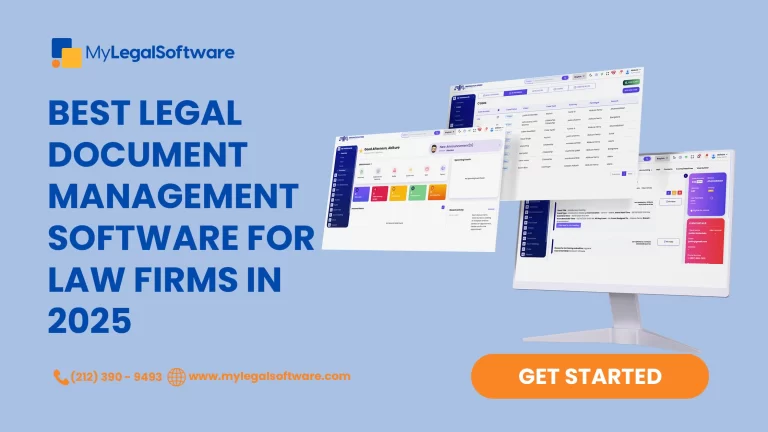In the law sector, efficient time management is essential. Sadly, according to the Association of Legal Administrators (ALA), law firms lose up to 50% of billable hours due to poor time tracking. Inefficiencies in time management systems often lead to such losses.
Time management can be challenging for lawyers and law firms, who must manage complex cases, numerous client meetings, legal research, and large paperwork. Meanwhile, traditional practices such as manual timesheets and invoices can be inefficient and inaccurate.
Legal time management software is designed to streamline and enhance the efficiency of your time-related processes. This article explores how it can effortlessly address common challenges and scale your firm’s productivity.
Understanding Legal Time Management Software
Legal time management software is a specialized tool designed to streamline and enhance time-related activities in a law firm. It is an efficient solution for time tracking, timesheet automation, integrated invoicing, analytics, and reporting.
Investing in legal time management software is crucial for law firms and lawyers because it helps to maximize billable hours, enhance firm productivity, build trust with clients, and improve the practice’s financial health.
Key Features to Look for in Legal Time Management Software
Inefficient time management can cause significant losses for law firms. Consequently, integrating legal time management software into your operations ensures that the chosen software fits your legal practice. Here are the essential features found to be ineffective software:
1. Time Tracking
Accurate time tracking is the backbone of efficient legal time management. You are less likely to log your hours if you cannot do so accurately while working them. A 2023 Legal Trends report found that lawyers bill only 31% of their time in an eight-hour day.
The most probable explanation for the outcome is that lawyers log fewer hours than they work due to poor time tracking. Therefore, efficient time tracking is non-negotiable in building a productive and profitable legal practice. Effective legal time management software requires robust time-tracking features and capabilities.
These make it easy to track your hours (billable and non-billable) efficiently and more accurately. The software records time on various case management tasks, including client consultations or meetings, legal research, and court representation.
2. Billing and Invoicing Integration
Efficient billing and invoicing are essential for your law firm’s financial health. Look for seamless integration with billing systems in legal time management software to streamline invoicing and ensure accurate billing.
The software can automatically create accurate invoices based on the time tracked and allow you to customize your billing rates, enhancing transparency and minimizing billing disputes with clients. Through integration with accounting tools, you can also streamline your financial processes.
3. Reporting and Analytics
An effective legal time management software should also have robust reporting and analytics capabilities. These capabilities should provide a comprehensive picture of your firm’s productivity and help you make data-driven decisions for better outcomes.
Seek software that offers detailed reports and analytics, providing insights into productivity, resource allocation, and profitability. This empowers your law firm to track time efficiently, understand the proportion of hours and resources spent on billable activities compared to non-billables, and make predictions such as future workloads.
With this information, you can make more strategic and adequately informed decisions that lead to better outcomes and greater success for your law firm.
4. User-Friendly Interface
A user-friendly interface facilitates the software’s smooth adoption by the legal professionals in your law firm. As a result, when choosing legal time management software, it is necessary to look for software with an intuitive interface that is easy to use, appealing in appearance, and customizable.
Effective software utilization may depend on features that make it easier, such as simple navigation and a minimal learning curve for lawyers. Customizability, such as personalizing dashboards and views, also contributes to an enjoyable user experience.
5. Security and Compliance
Protecting client data is a priority in legal practice management and a key consideration in integrating technology into your law firm’s operations. Robust security features protect sensitive client information and ensure compliance with legal standards.
The right legal management software should possess strong data security features such as high-level encryption protocols, role-based access controls, and audit trails to track changes and activity and ensure compliance. Choosing a legal time management software is a key decision for any legal practice.
In addition to seeking these features, you should evaluate them based on your law firm’s specific needs, workflows, and circumstances. Immigration Speed is a legal software designed to provide all the key time management features and is a customizable solution suitable for legal practices of all sizes and needs.
Top Legal Time Management Software Options
Many law firms continue to lose time with manual processes and depend on antiquated time-tracking systems.
However, legal time management can be difficult, time-consuming, and governed by stringent regulations and legal standards. Leading legal time management software options from which you can choose include:
1. Timeular
Among time-tracking apps for lawyers, Timeular is the easiest to use and most straightforward. In addition to helping legal companies manage compliance needs and billing more effectively than conventional bookkeeping and invoicing software, it simplifies and tracks all hours worked, streamlining the time-tracking process.
2. Clio
Clio manages cloud-based legal timekeeping services, making it simple and effective to precisely record lawyer time from any location and review time entries.
With Clio’s smooth (250+) integrations, law firms may connect their practice management software to other systems and tools. These interfaces allow sharing of data and automation processes between several software programs.
3. Clockify
You may use Clockify to track time against legal tasks, view progress, and estimate how long each task should take. Clockify will provide a breakdown of all monitored time per customer and send you an alert if a project or client exceeds budget.
You may check the amount of time that is billable and non-billable, calculate your earnings, round time up to the nearest billable increment, and export data for invoicing. With Clockify, you can track every call, email, and meeting to bill clients for every working minute.
4. LawPay
LawPay Pro’s automatic expense monitoring makes connecting such expenses to cases simple. Legal practitioners can use this service to record, enter, and categorize their time. Several precise, comprehensive bills may be sent with only a few clicks thanks to LawPay’s legal time-tracking software features, which include time and expenditure monitoring and automated invoice printing.
5. Time Analytics Software
Lawyers can use Time Analytics as a very effective tracking tool. The software integrates timesheets and automatic time clocks to ease the time-tracking process. Additionally, it links every entry to the relevant project and client. It also provides the extra freedom to customize billing rates for different projects, guaranteeing accuracy in the billing procedure.
Immigration Speed stands out among top time management software, particularly because it combines all these advanced features with higher customization, integration capabilities, and scalability.
Benefits of Using Legal Time Management Software
The integration and use of legal time management software solutions afford you many advantages. These include:
1. Increased Accuracy in Billing
Legal software minimizes human entry errors and omissions by automatically recording billable hours as you work.
This guarantees that each minute spent on a case is precisely recorded. Additionally, in-depth time logs act as an audit trail, enabling the timely correction of any inconsistencies and the verification of billed hours.
2. Enhanced Productivity
Legal professionals can concentrate on their main responsibilities by automating time tracking and becoming more productive.
The firm gains value, and every minute spent on a case is optimized. Real-time time data monitoring enables task automation while assisting in identifying and correcting anomalies.
3. Better Client Management
Attorneys can use time management tools to allocate resources according to their client’s needs, thereby optimizing the time they spend on client concerns by reevaluating non-billable activity.
Legal teams can also collaborate more easily when documents are drafted in real-time, and comments are time-stamped to track time effectively. These features are available to everyone, simplifying work cooperation and communication.
4. Improved Financial Health
A financially successful law company starts with efficient timekeeping and billing software. Legal time-tracking software guarantees accurate billable hour recording, which lowers inaccuracies in client invoices to guarantee correct billing. This promotes timely payments and better cash flow.
The software helps businesses properly manage expenses by streamlining the process of tracking expenses. Furthermore, the real-time spending reports facilitate well-informed decision-making.
Legal time management software guarantees the appropriate management of trust accounts, adherence to industry norms, segregation of client funds from operational accounts, and financial openness.
Extensive reporting functionalities expose unpaid fees and past-due obligations and encourage well-informed financial choices that propel overall achievement.
Case Studies and Success Stories
Leading law firms leverage legal time management software to remove inefficiencies from their time-related processes. Gehi & Associates have particularly transformed their firm’s financial health and productivity after implementing the top legal software, Immigration Speed.
The law firm integrated the software into its operations to address its challenges with missed billable hours and a few billing disputes. In recent feedback, they have reported zero disputes, increased client trust, improved case management outcomes, higher revenues, and better workflow productivity, among other benefits they now enjoy.
You can also experience these gains through Immigration Speed. Try the software for free or book a demo
How to Choose the Right Legal Time Management Software for Your Firm
This guide contains steps that can aid you through the process of choosing a legal time management software for your law firm:
1. Assessing Your Needs
Analyze your current workflow and time management inefficiencies to identify the specific needs of your law firm. Additionally, identify your goals and set priorities as you investigate different options. Furthermore, consider your core practice areas, law firm size, and your existing tools and systems with which the software may have to integrate. Finally, based on your assessment, outline the key features you want and need for your law practice.
3. Comparing Features
Since your assessment has revealed the features your firm mostly needs, the next step is to compare the features of various software options to find the best fit. Explore and evaluate the key features outlined earlier in this article including time tracking, billing and invoicing, reporting and analytics, user interface, and compliance.
Check for the presence of these features, additional advanced features, and the degree of capability the different options possess. Identify the best fit for your law firm’s needs and circumstances.
4. Considering Budget
Investing in the right legal time management software reaps long-term gains for your law practice. Nonetheless, it is important to consider your budget and the cost of integrating the different suitable options into your operations when choosing software.
Consider the upfront costs, such as initial setup fees, licenses, and any other initial requirements, as well as monthly or annual subscription costs. Additionally, assess the software options’ ability to accommodate your firm’s growth over time without significant cost increases.
A scalable software is most preferable particularly for growing law firms in fast-paced environments. In considering the cost of implementing legal time management software, consider the potential benefits of higher efficiency and revenue growth as well as what your firm can sustainably afford.
5. Trial Periods and Demos
It is highly recommended that legal software be tested before making financial commitments. You can achieve this by taking advantage of trial periods and demos.
Free trials allow you to gain first-hand experience implementing the software in your law firm’s workflows and real-life cases or scenarios. It helps you practically know whether the software is a right fit for your practice without any financial commitment.
Likewise, demos walk you through the software’s features and what it can do for your law firm. Trial periods and demos give you the opportunity to test-drive the software, receive feedback from your legal team, and receive support and training from the software provider.
More so, it helps you to make an informed decision, making it a win-win situation for you!
Conclusion
Doubtlessly, efficient time management is pivotal for a legal practice’s productivity, profitability, and success. Time management affects a law firm’s billing and invoicing, task management, financial health, client service, operational efficiency, and workflow productivity.
Therefore, efficient practices such as timeliness, accuracy, automation, and detailed reporting, among others, are important in legal practice management. Despite the challenges associated with time management in the legal industry, lawyers and law firms can significantly transform their time management by implementing the right legal time management software.
Top software options offer advanced features to maximize billable hours, enhance productivity, build client trust through transparency, optimize financial health through automated time tracking, customization, detailed reporting and analytics, and security and compliance.
Evaluate your current time management and consider upgrading to advanced solutions like Immigration Speed for better legal time management for your law firm. Schedule a demo or start a 14-day free trial!
FAQs
Here are some frequently asked questions.
1. What features should I look for in legal time management software?
Depending on your firm’s requirements and needs, look for time and expense tracking, billing and invoicing, calendaring, reporting and analytics, compliance, and security features.
2. How can legal time management software improve my law firm’s efficiency?
Through its automation and accurate tracking features, legal time software ensures effective management, accurate billing, and transparency with clients, leading to better productivity.
3. Is it worth investing in legal time management software for a small firm?
Investing in legal time software is an advantageous venture, as this software can be used and adjusted to suit your law firm’s needs regardless of its size.
4. Can legal time management software integrate with my current billing system?
Yes, most legal time management software can integrate seamlessly with your existing software and data.
5. How do I choose my firm’s best time management software?
Analyze your firm’s workflow and needs, and take advantage of free software trials to choose which one best suits your firm.








